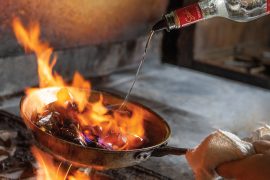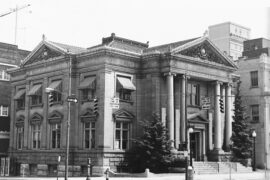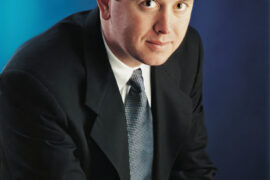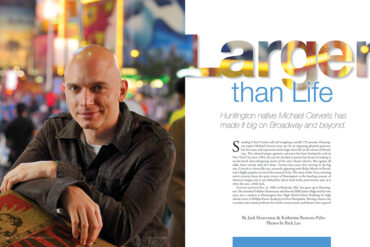The most powerful person at St. Mary’s Medical Center is a sharp, witty and infinitely likeable woman who has devoted her life to serving others.
Interview by Jack Houvouras
HQ 74 | SUMMER 2011
She may be small in stature, standing at only 5 feet 2 inches tall, but Sister Celeste Lynch at St. Mary’s Medical Center is a big player in the health care world. As president of Pallottine Health Services, the parent company of both St. Mary’s and St. Joseph’s Hospital in Buckhannon, W.Va., she is at the top of the corporate ladder. But, most people would never know it. Dressed in a modern-day black habit and possessing a warm and inviting smile, she seems like any other nun who works tirelessly each day at St. Mary’s. People who get to know her find that she has a wonderful sense of humor and a mind that is razor-sharp. A Huntington businessman who served on a board with her once remarked, “She has the kind of charm that could convert a die-hard atheist.”
She was born Mary Lee Lynch on June 19, 1924, in Bristol, Tenn. Growing up on a large dairy farm, she was a typical tomboy and could often be found milking the cows, climbing trees and playing sports. Although she was born into a large Catholic family, there were no Catholic schools in the area, so her only formal exposure to the faith came during the summer when nuns from the Pallottine Order in Huntington, W.Va., would visit. Each summer they would teach the children about the Bible and the Catholic faith.
Upon graduating from high school, she decided she wanted to become a nurse and chose to attend St. Mary’s School of Nursing, run by the Pallottine Sisters she had come to know so well over the years. She never had an intention of becoming a nun, but the things she experienced in school and at the hospital would have a profound impact on her life. When she ultimately decided to join the convent, she thought her parents would be pleased. However, that wasn’t the case.
We sat down recently with Sister Celeste and asked her to look back on a life devoted to God and serving others. Her answers didn’t disappoint.
What was it like growing up in Bristol, Tenn.?
I grew up on a big dairy farm with about 100 cows. My uncle had his own milk route, and he did his own pasteurizing and bottling. And you know, there’s no vacation on a farm when the cows have to be milked twice a day. The first thing we’d do when we got out of school was change clothes and go down to the barn.
All of that hard work must have required a big family.
I am the second oldest of seven children – I have two sisters and four younger brothers. I always thought my dad was disappointed that I wasn’t a boy, so I tried to make up for that. But the next four that came along were all boys, so I ended up having a lot of competition.
Rumor has it that you had a crush on Tennessee Ernie Ford when you were a teenager. Is that true?
He wasn’t Tennessee Ernie Ford back then; he was just Ernie Ford, and he was our local radio announcer. And he was the best-looking guy I’d ever seen. My uncle had a market in town where I worked throughout high school. Any time Ernie Ford would come in, I’d make it my business to wait on him. (Laughs) So yes, I did have a crush on him.
How did you find your way from Bristol to Huntington?
We didn’t have a Catholic school in Bristol, so I attended public school. But the Pallottine Sisters from Huntington came to Bristol every summer to teach us Bible history and the Catechism of the Catholic Church. So it was during those summers that I really got to know the Pallottine Sisters. I didn’t come to Huntington be a nun, though; I came to be a nurse.
What led you to enter the Pallottine Order?
I was in nursing school for about six months, and I was so impressed with the way the Sisters took care of the patients – whether they could pay or not. I wanted to be a part of that. And to the Sisters, there wasn’t any such thing as an eight-hour workday. When I first came here, they had two shifts – 7 a.m. – 7 p.m. and 7 p.m. – 7 a.m.
What was your parents’ reaction when you told them about your decision to enter the convent?
They were against it. The Second World War was going on at that time, and my mom thought two of my brothers would be called to service. She wanted me to come home to help on the farm. Also, my mom didn’t know much about the convent or what it was like. I was a big tomboy when I was young – I was really active in sports – so she just couldn’t picture me in a convent. But that’s because she didn’t know what the convent was like; she didn’t know you could have fun in a convent too.
Did she eventually change her mind?
It took her a long time. Back then, the rules were very strict and we couldn’t go home except for the death of a parent. Parents were allowed to come visit us, but mine never did. One day, I was caring for a patient who had just had surgery. Her name was Mrs. Paver and she said, “Your mother must be awfully proud of you.” I told her I hadn’t seen my mom in five years, and she said, “When I get well, you’re going to see her.” Of course I didn’t think anything about it. Well, about a month later, I got a letter from my sister saying that a Mr. & Mrs. Paver had been down to see my family. The Pavers had driven all the way from Wilcoe, W.Va., to Bristol, Tenn. I thought, “Oh my goodness, I hope my mom didn’t meet them with a shotgun!” But Mrs. Paver met with my mom and told her, “You ought to go see your daughter. She was my nurse and she is very happy.” My mother said, “I can’t; it’s too far.” So Mrs. Paver offered to drive my mom to Huntington. The day she came to visit, I told the Sisters that I didn’t want anyone else to be in the parlor when I went to meet my mom. But when I went to the parlor I saw Mr. & Mrs. Paver, Mother Christine and my mom. They all had their handkerchiefs out, and I thought to myself, “Nuns aren’t supposed to cry!” So there I was, trying not to cry, and finally Mother Christine said, “Sister Celeste, for heaven’s sake go ahead and cry!” So we were all crying, and when my mom saw that I was truly happy, she was a changed person. I think that’s all she wanted – to know her children were happy.
Did you and your mom maintain a close relationship from then on?
Oh, yes. Around two years before Mom died, I was at home visiting her. By this time the rules in the convent had changed and we were allowed to visit our families. I thought to myself, “I’ve got to find out from my mom what I did that hurt her the most.” I thought she was going to say entering the convent, because I had never gone against her before that. So, we were by ourselves in her living room and I asked her. She said, “What hurt me the most was when you fought with your brothers.” I asked her what I did that made her the happiest, and she said (pauses), “Entering the convent.” Hearing that from her own lips made my day.
What is the hardest part of the life you have chosen?
This might seem like a contradiction, but for me the hardest part is community living. You have all these different personalities, and you don’t choose who you live with. But at the same time, it’s one of my joys; if you’re sick, or something happens to you or someone in your family, they are all there for you. You get all of that help and support.
Can you tell us about St. Vincent Pallotti, for whom your Order was named?
St. Vincent Pallotti was a very holy man. He was born in Rome and he became a priest during a very tumultuous time. There was a lot of anti-clericalism at that time, and the laity were trying to take over the church. It was during the cholera epidemic, when so many people died. So many children were left orphans that Saint Pallotti opened a home for young girls who were living on the street. He had laywomen come in to teach them and take care of them. Those first laywomen were how the Pallottine Sisters started. That house still stands today, and children still live in it. He died in 1850.
You knew some of the Founding Sisters. How did they influence you?
A lot their influence was just in how they lived. I was inspired by their faith, their trust in God, how hard they worked and the sacrifices they made.
How did eight Pallottine Sisters who came to Huntington in 1924 to open a humble 35-bed hospital build a medical center that today is the largest tertiary-care hospital in the Tri-State?
Through prayer, faith, sacrifice and hard work, and the help of the doctors and laity.
Are you concerned about the dwindling number of Sisters, not only in the Pallottine Order but also in the Catholic Church as a whole?
Very much. In my mind, there are several reasons for this. The consumerism and materialism that we see in society today is a big factor. But there are also many changes that have taken place since Vatican II in the church, in society and in our religious communities. Today there are so many things that laywomen can do without entering the convent. Vincent Pallotti was ahead of his time; he always said that the priests and religious cannot take care of the people by themselves, that the laity must be involved.
Who do you think will be carrying on your work in 50 years?
We hope laypeople will. We have already started preparing for that. In 1968, we had our first lay administrator, Mr. Steve J. Soltis. And in our 86 years, we’ve had only six CEOs; three of them were Sisters and three were laymen. I think the transition was hard for some of the Sisters at first, but we’ve been blessed with great CEOs. In 1988, Sister Diane Bushee and I started Pallottine Health Services, the parent organization for St. Mary’s and St. Joseph’s, located in Buckhannon, W.Va. We’ve set up individual boards for each of our hospitals, and members of the community serve on those boards. We have been trying to prepare these people to carry on our Catholic identity and values when we’re no longer here.
Do you think the Catholic Church needs to make any changes, like allowing priests to marry?
Well, the religious priests would not be able to marry because they have to live in community, like the Sisters. But the secular priests, the parish priests – really and truly, I don’t know why they couldn’t marry. We have Episcopalians who’ve become Catholics, and they are married, and they can be a priest in a Catholic Church. To me, that’s not quite fair. I know some priests who would come back tomorrow if the Catholic Church would allow them to stay married.
St. Mary’s was founded as a hospital that would serve the needs of the sick and injured, regardless of their ability to pay. From a business standpoint, how do you carry on this mission today with health care costs spiraling out of control?
It’s very, very hard. In our policies, we have a preferential option for the poor within the limits of our available resources. We can’t be everything to everybody, and we can’t bankrupt ourselves to take care of the poor. But what we try to do is see that the poor get help, perhaps from other agencies they may not know about. We also have the Pallotti Fund, and the hospital donates $80,000 to that every year. Most of that money goes to help pay for medicines when the poor are discharged from the hospital. If we didn’t provide that, there are many patients who wouldn’t be able to afford their medicine, and they’d be right back in the hospital.
Nearly everyone in America believes something must be done to deal with skyrocketing health care costs, but no one can agree on a solution. What are your thoughts on the subject?
Every time you turn around, they’re changing the health care laws or talking about repealing them. I really think there are some good things in the new health care law; there are some things that probably should come out; and there are other things that weren’t put in that should be. If the members of Congress would stop fighting each other and work together, they could solve this. We all need to collaborate more.
You are the president of Pallottine Health Services Inc. Where did you learn the business side of what you do today?
I graduated from the School of Nursing in 1950, and then I went to St. Louis University and got my bachelor’s degree in nursing education. I was the director of the nursing school here for 17 years, and then I went to Catholic University in Washington and got my master’s in nursing administration. I went to Creighton University in 1976 where I got my master’s in Christian spirituality. Being an administrator is the last thing I would have chosen on my own, but holy obedience will make you do a lot of things you wouldn’t expect. (Laughs) I do enjoy what I do now, though.
In your years working as a nurse, is there one memory of a patient that stands out in your mind?
Yes, there is. And I will never, ever forget him. He was a young man who was a prisoner. He tried to escape and a guard shot him. He was paralyzed from his neck down, and he knew he was going to die. It was really scary to see the anger and the hatred on this man’s face, but I said to him, “Do you want me to pray with you?” He spit at me and turned his head to the wall. And I said, “Well, I’m going to pray for you, and I’m going to get the other Sisters to pray for you.” I left and I told the Sisters, “There is a patient who’s going to die, but he’s not ready to die yet.” We all prayed. I went back in later and told the man, “I’ve been praying for you and the Sisters have been praying for you. God is a merciful, loving God. I don’t care what you’ve done; I don’t care how bad it was. He will forgive you.” And he didn’t turn away this time. I went back to the chapel after that, and continued to pray. Before I went to bed that night, I went back up to see him, and I said, “We’ve really been praying for you. And I bet there’s someone else who’s been praying for you, and that’s why you’re here at St. Mary’s. I bet it’s your mother.” And this big tear rolled down his face. I told him again, “God is loving and merciful. All you have to do is be sorry and want what God wants for you.” I showed him the crucifix and said, “This is how much He loves you. He did all of this for you. If you are sorry, kiss this crucifix.” And I put it on his lips, and he kissed it. The first thing I did the next morning was call to see how he was doing. He had died during the night. And to see that, to see that transformation take place in one day through God’s grace and mercy, I will never forget it.
What was the most rewarding part of your career as the director of the St. Mary’s School of Nursing?
I came from a very protective family, so when some of our students would tell me what their family life was like, I couldn’t believe it. To be able to help them work through some of that was very rewarding to me. We had a student who became pregnant and wanted to have an abortion because she thought her parents would disown her if they found out. I talked with her many times and eventually she decided to keep the baby. Her parents would not allow her to come home, so I found a place for her to stay in Buckhannon. I saw her after the baby was born, and she put her baby girl in my arms. That was very rewarding.
In your opinion, what have been the most remarkable advances in medical technology in your lifetime?
When I was a student, to do a cataract surgery meant that the patient would be in bed for days. They would have sandbags on each side of their head so they couldn’t turn their head. You would have to feed them, and you’d have to bathe them. Now they walk in, get their cataract removed and go home the same day. That’s pretty neat, isn’t it? And all of the robotic technology is amazing. We have these robots that allow doctors in rural parts of the state to communicate face-to-face with our doctors here.
What was it like meeting Pope John Paul II?
We had a private audience with him because we had a lot of Polish sisters over there. He spent a lot of time with each of the Polish sisters first, and when he came to me, I said, “Holy Father, I’m not Polish, but I’m your Sister too.” He looked at me and he said, “Where are you from?” (Laughs) He patted my head and made the sign of the cross on my forehead.
You have been all over the world, including South Africa, Belize, Germany and Switzerland. What was your most memorable traveling experience?
One of the neatest places I saw was the town of Assisi in Italy. It was not commercialized at all back then, and it was so quiet and peaceful. You just felt the peace of St. Francis in that area. That really struck me.
What do you like most about living in Huntington?
The friendliness of the people. From the very beginning, the laity have helped us, even when we first started in the old building. I think when the Sisters first came here there was a lot of prejudice towards Catholics. But with the way the Sisters took care of their patients, they soon broke down that prejudice. They showed that they were here to love the people.
What is something that no one knows about you?
If I told you that, I’d have nothing left to not tell anybody!
Rumor has it that you like to tell jokes. What is one of your all-time favorites?
This nun got into a cab, and the cabdriver kept staring at her. She finally said, “Why are you staring at me?” He said, “Oh, Sister, I’ve always had this fantasy of kissing a nun.” So she said, “I think we can take care of that, but you have to be Catholic and you have to be single.” He said, “I’m Catholic, and I’m single.” She said, “Well, pull into the next alley.” So he pulled into an alley and he kissed her. They got back on the road after that, but then the cab driver started crying. The nun said, “What’s the matter? Why are you crying?” He said, “I’ve got a confession to make. I lied to you. I’m not a Catholic; I’m a Jew. And I’m married.” And the nun said, “Oh, that’s okay. My name’s Kevin, and I’m on my way to a Halloween party!”





